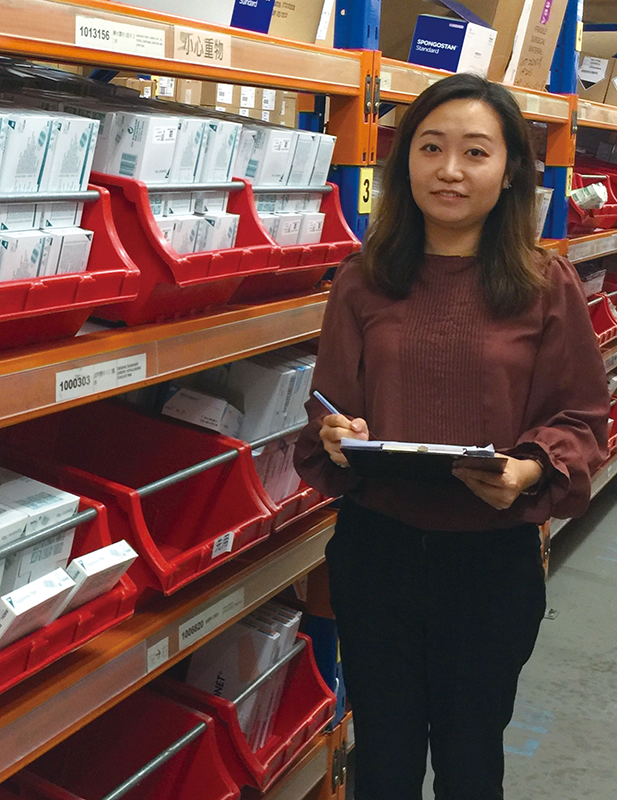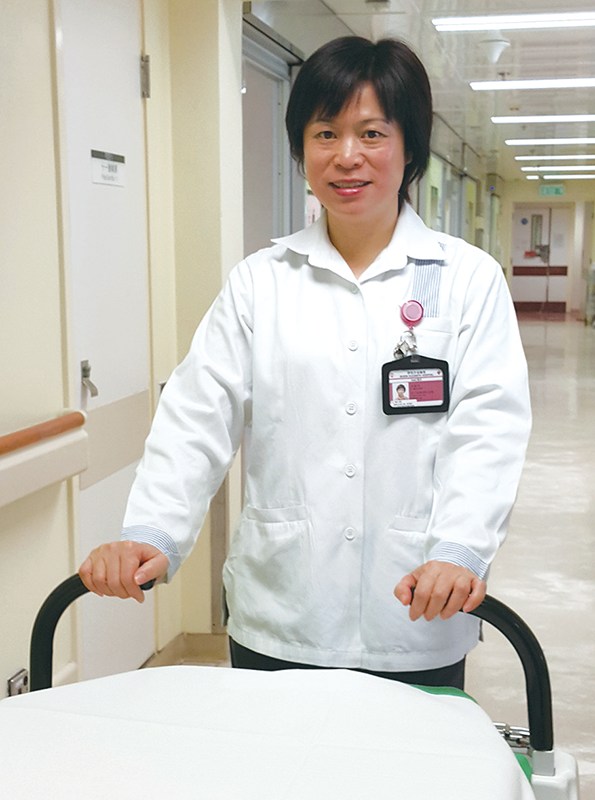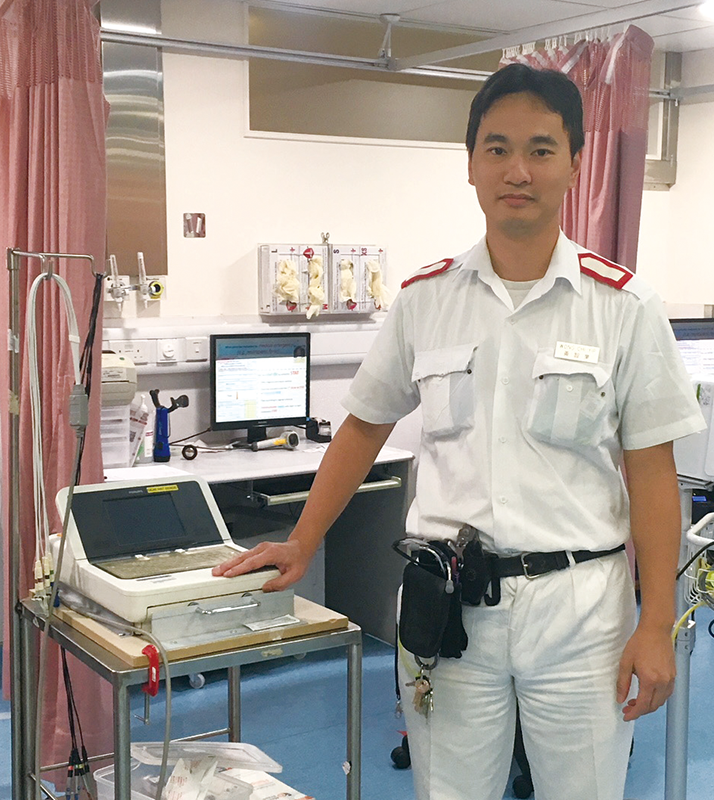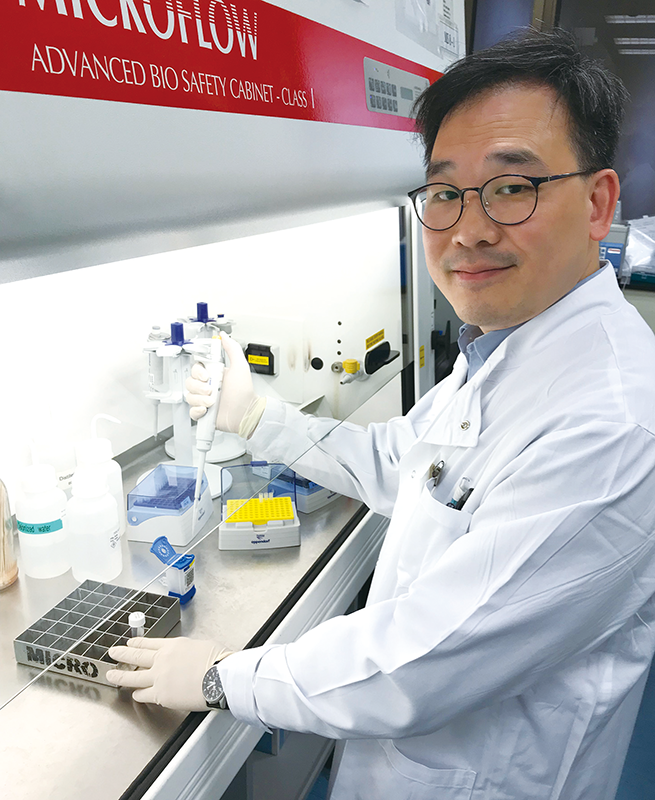
Despite the high demand for medical services during winter surge, frontline colleagues strive to maintain the quality of the services delivered, adhering closely to their duties to serve the public. HASLink has interviewed colleagues responsible for different tasks to share with us their contributions at the service peak.
Carmen Lee
Clerk II Hospital Supplies Units
Queen Elizabeth Hospital
Hospital stocker to ensure stable medical supplies
Apart from a team of skilful medical staff, ample medical supply is another pillar of successful treatment to patients. The Hospital Supplies Units are the hidden heroes who work to ensure abundant medical supplies for clinical treatment. For example, there is a two-month stock of medical supplies in Queen Elizabeth Hospital (QEH) currently, and a 90‑day stock of personal protective equipment in the cluster.
“To meet the growing demand during winter surge, we started purchasing consumables such as surgical masks, gauze and suction catheters in September last year. Moreover, there is a supply cabinet designated for each of the 120 departments in QEH. Frontline colleagues can be reassured of the sufficiency and effectiveness of supplies in the cabinet because our team takes stock weekly. Ward staff members can also contact us in case of quick supplies consumption. Consumables will be delivered to the department in the afternoon following a request made in the morning to sustain clinical services.”
Li Mui-wah
Part-time Patient Care Assistant (Supporting)
Queen Elizabeth Hospital
Sunshine Team to brighten up the wards
To ease the manpower strain during the service peak, QEH has established the ‘Sunshine Team’ in 2013 to provide assistance to hospital staff in wards. The team now comprises 65 members to provide cleansing, drug delivery and portering services in Medical, Surgical, Orthopaedic and Neurosurgical Departments.
“I work 16 to 20 hours a week in a medical ward to clean and disinfect facilities like beds, tables and handrails to minimise the risk of infection for both patients and staff. I clean over 50 beds every day. During winter surge, I am responsible for portering service between wards and discharge lounge to speed up bed turnover rate. What I find meaningful about the work of the Sunshine Team is that we can share the workload of hospital staff, who will then have more time to take care of patients. I often chat with the elders while cleaning the ward and feel accomplished when they compliment on the cleanliness of the ward.”
Wong Chi-yip
Advanced Practice Nurse A&E Department
Queen Elizabeth Hospital
RAT to shorten waiting time
Among around 500 patients who seek medical aid at the QEH Accident & Emergency Department every day, over 250 belong to the category III (urgent cases), which constitutes the highest ratio among all the public hospitals in the city. As a result, QEH has introduced the ‘Rapid Assessment Treatment’ (RAT) team in 2014 which made up of two experienced doctors and nurses, phlebotomists and patient care assistants respectively. The team specialises in treating category III patients, including cases of angina, shortness of breath, bone fracture and elders with fever. These patients will meet experienced doctors for diagnosis and treatment plan design after going through triage assessments by nurses. In this way, the waiting and treatment time can be shortened. At the same time, RAT can help identify patients with hidden risks earlier, such as those with aortic dissection or aortic aneurysm. In the past, patients may have to wait for over 45 minutes to meet the doctor for diagnosis in busy period. After the introduction of RAT, over 90% of the patients can be treated within 30 minutes. RAT handles some130 cases daily during the service surge. It plans to expand the team with one more doctor and nurse and extend its service hours to 10am - 10pm.
Eddie Leung
Scientific Officer Department of Microbiology
Prince of Wales Hospital
‘Adviser’ to conduct numerous flu tests
If medical staff members are mighty fighters in the battle against diseases, laboratory technicians are the trusted strategic advisers who identify weaknesses of the opponents to help frontline fighters defeat the enemy soundly.
“We test 100 flu samples on an average day but some 200 samples daily during winter surge. We’ve installed extra automated real-time PCR machines to increase the number of machines in use to four for influenza tests this year. Knowing that our colleagues in ward need a report right away to carry out the triage process, we strive to deliver the reports as soon as possible after receiving a sample.”
During the influenza season, HA laboratories have enhanced the virology services by providing a more sensitive test, the PCR test, for detecting seasonal influenza. This year, the enhanced service has been extended to all patients presenting with influenza-like illness symptoms, with an aim to facilitate clinical management and expedite bed mobilization. It is estimated that the service demand will increase to 100,000 tests from 30,000 tests last year.
COVER STORY
● Comprehensive education to maintain high awareness
● Effective tactics against violence
● A closer look at workplace violence
● Ultimate backup for staff subject to threats
● What is Hospital Authority Bylaws?
FEATURE
● Collective efforts from frontline for winter surge
● Start 2018 with a runner’s high
HELEN HA
● Dr Cheung Wai-lun shares his secrets of success
WHAT'S NEW
● HA took part in exercise to prepare for nuclear emergencies
● A big step towards paper-free workplace at PMH
● Nurse clinics migrate to integrated model
● Recruitment to strengthen nursing workforce
STAFF CORNER
● Look for colleagues’ contact at your fingertips
● BookHA extends SOPC new case booking to Obstetrics and Paediatrics
● 生命搶救戰 (Chinese version only)




